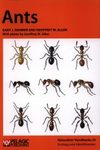Field / Identification Guide Identification Key
By: Brian Moss(Author), William DJ Kirk(Preface By)
216 pages, colour photos, colour & b/w illustrations
![Ponds and Small Lakes Ponds and Small Lakes]()
Click to have a closer look
About this book
Contents
Customer reviews
Biography
Related titles
About this book
Ponds and small lakes support an extremely rich biodiversity of fascinating organisms. Many people have tried pond-dipping and encountered a few unfamiliar creatures, such as dragonfly nymphs and caddisfly larvae. However, there is a far richer world of microscopic organisms, such as diatoms, desmids and rotifers, which is revealed in Ponds and Small Lakes. Anyone with access to a microscope can open up this hidden dimension. Identification keys are provided so that readers can identify, explore and study this microscopic world. There are also many suggestions of ways in which readers can then make original contributions to our knowledge and understanding of pond ecology.
Ponds and Small Lakes not only explores the fascinating world of the creatures within ponds and their interactions, but also explains the many ways in which ponds are important in human affairs. Ponds are being lost around the world, but they are a key part of a system that maintains our climate. In the face of climate change, it has never been more important to understand the ecology of ponds.
Includes keys to:
A – Traditional key to kingdoms of organisms;
B – Contemporary key to kingdoms of organisms;
C – Pragmatic key to groups of microorganisms;
D – Algae visible, at least en masse, to the naked eye;
E – Periphyton, both attached to surfaces and free living;
F – Protozoa;
G- Freshwater invertebrates and;
H – Common phytoplankton genera in ponds
Contents
1 Ponds
2 Living in freshwater
3 The littoral
4 Plankton
5 Catchments, nutrients and organic matter
6 The ecological development of ponds and lakes
7 Food webs and structures in ponds
8 Problems with ponds and small lakes
9 Ponds and the future
10 Bibliography and further information
Index
Customer Reviews
Biography
Getting wet and muddy was a childhood trait that Brian Moss never quite grew out of. His research and teaching have embraced freshwaters on five continents over fifty years, a range of approaches from field survey to laboratory and whole-lake experiments and a gamut of sites from lakes in Malawi, Tanzania and Michigan, to thermal streams in Iceland, the Norfolk Broads, the North-West Midland Meres and temperature-controlled ponds at the University of Liverpools Botanic Gardens. When he retired from Liverpool as Professor of Botany in 2008, he was spending at least as much time with invertebrates and fish as with plants and algae. His work has been widely published, with a textbook on Ecology of Freshwaters, soon to appear in its fifth edition, books in the New Naturalist series on The Broads and Lakes, Loughs and Lochs, and a manual on lake restoration. He has been President of the International Society for Limnology and Vice-President of the British Ecological Society. He was awarded the Institute of Ecology and Environmental Managements annual medal for his lifes work and leadership in shallow-lake research in 2010, and the Ecology Institutes Excellence in Ecology prize in 2009. This entailed the writing of a book, Liberation Ecology, which interprets ecology for the general public through the media of the fine arts. The book won the Marsh Prize, in 2013, for the best ecology book published in the previous year. Brian loves teaching, plays the double bass (not very well), writes satirical doggerel, often directed at officialdom, and is exercised daily by a large dog.
Field / Identification Guide Identification Key
By: Brian Moss(Author), William DJ Kirk(Preface By)
216 pages, colour photos, colour & b/w illustrations
This book is an excellent addition to the Naturalists' Handbooks series and a testament to the author's ability to explain the complexity of fresh waters to a non-specialist audience. It introduces all of the key elements needed to understand ponds and small lakes, including physics and chemistry in addition to biology and ecology, in a straightforward manner, and is interspersed with realistic practical experiments that can be carried out without the need for a laboratory or complex equipment.
However, despite the wealth of information it packs into a compact space, it is the simple, practical and copiously illustrated identification keys that are undoubtedly destined to become its most compelling feature. Those for micro-organisms will be particularly welcomed and I suspect that it will be instrumental in making this component of pond life accessible to a wide audience.
—Mike Dobson, ex-Director of the Freshwater Biological Association


















































